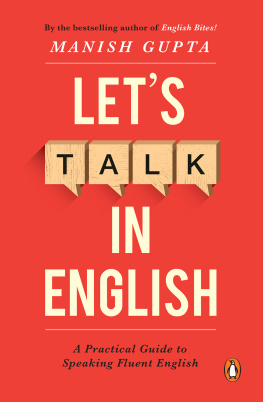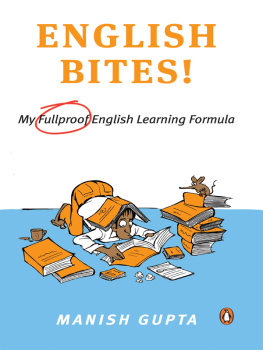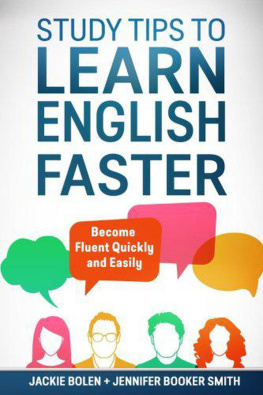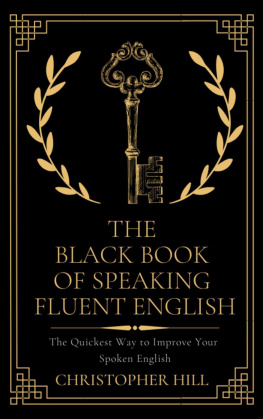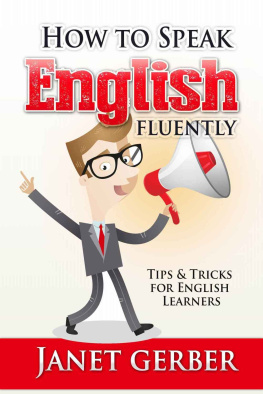Contents
MANISH GUPTA
LETS TALK IN ENGLISH
A Practical Guide to Speaking Fluent English

PENGUIN BOOKS

PENGUIN BOOKS
PENGUIN BOOKS
LETS TALK IN ENGLISH
Manish Gupta is a leadership consultant, facilitator, and trainer. When not providing consultancy advice to companies, this ex-banker examines the vagaries and idiosyncrasies of the English language. He also likes trivia, travelling, adventure sports, delving into human psychology, and giving professorial discourses to colleagues, family, and friendspractically anyone who can give him a patient hearing. He debuted as an author with English Bites! (published by Penguin Books India, 2012)an unconventional and fun way of gaining proficiency in English, with focus on vocabulary, pronunciation, and spoken skills.
Manish is an engineering graduate of PEC University of Technology, Chandigarh, and has an MBA from XLRI, Jamshedpur. He lives in Mumbai with his wife, Deepali, a medical professional, and their daughters, Tamanna and Prakriti.
Manish can be reached at:
Email:
Facebook: facebook.com/manishdeepaligupta
Twitter: @English_Bites
ALSO BY THE SAME AUTHOR
English Bites!: My Fullproof English Learning Formula
To
My parents
My wife, Deepali
My sister, Ruchi
My parents-in-law
My daughters, Tamanna and Prakriti
All the aspirants of CAT, XAT, GRE, and GMAT
and
All students from the vernacular medium
Writing a book is an adventure. To begin with, it is a toy and an amusement; then it becomes a mistress, and then it becomes a master, and then a tyrant. The last phase is that just as you are about to be reconciled to your servitude, you kill the monster, and fling him out to the public.
Winston Churchill
Prologue
I n September 2013, I was addressing a group of mid-level and senior executives from a large Indian company on struggle, triumph, happiness, and productivity. There were over 100 people in the hall, including the companys CEO. I began by taking a poll on a) how many of the attendees had studied in a vernacular-medium or pseudo-English-medium school, b) how many had studied in small towns, c) how many had parents who didnt know how to speak English, and d) how many still felt somewhat deficient in their command over the English language. An overwhelming majority of them responded in the affirmative to all four questions. I wasnt expecting anything differentI belong to the same group myself.
So I started the talk, as planned, by sharing the most embarrassing moments of my life, especially those linked to my poor vocabulary, pronunciation, and inability to speak English until long after I had joined PEC. I also expounded on my principle, If you are weak, aim to teach! to motivate people to overcome deficiency of any kind. Let me explain.
At engineering college, we were a group of three friends, and all of us had a major developmental need. I was weak in all aspects of the English language, one friend had extremely poor general knowledge, and the others writing lacked literary and poetic expression. We gave ourselves the very ambitious target of writing a book each on the topic of our biggest weakness before we left the institute and promised to help each other out.
If we came across some material on general knowledge or trivia, it was passed on to the friend who was trying to improve his general knowledge by writing a book on quizzing. If my friends stumbled upon something in English that was a bit hard to comprehend, it was considered good material for me, and so on and so forth. While we were intensely collaborative, we also became fiercely competitive, fuelling each other on through reminders of the rapid strides we needed to make to achieve our targets.
We quickly started realizing the benefits of aggressive target setting and creation of a competitive yet collaborative environment. Most significantly, we were reading copiously, learning rapidly and forming a base of reference material. But at the same time, we were exasperated by the vastness of the scope and how little time there was to comprehend and retain the material.
I was particularly bothered by my lack of retention of word meaningswords would look like unfamiliar, foreign matterand had to quickly fish out some memory techniques. Thus, my interest in the field of mnemonics was born. It gave me fodder for my first book, English Bites! A mnemonic is anything that assists your memory. It is anything that can help you remember those tough English words that you routinely struggle to get into your mind and keep there. The mnemonic could be your most embarrassing moment, an imagined incident (the crazier the better), an amusing anecdote, a joke, a rhyming verse, interesting etymology, or some humorous interplay of the letters of the difficult word at hand.
In my talk, I shared many examples of the mnemonics I had created to improve retention, accelerate the pace of learning and infuse an element of fun into the journey. At the end of the first session, I requested people to come forward and share their own stories of struggle and triumph linked to the language and their own mnemonic techniques. After all, I reasoned with them, I couldnt be the only one with novel ideas on accelerated language learning.
At this point, the CEO stood up and shared his story. He belonged to a lower-middle-class family in Kolkata. Since his parents couldnt afford to pay the tuition fee of a good English-medium school, he studied under the local board curriculum, wherein English was taught only from the seventh grade, giving him only five years to learn the language before joining an engineering college. During his first year of engineering, he tried extremely hard to make technical or even casual conversation in English; however, he was completely at sea when it came to spoken English. He was exasperated and deeply demotivated. Then, he realized why his attempts at speaking with peers were ending in disaster. The challenge lay in his mind. He would begin feeling inferior, and thus uneasy, even before he opened his mouth to speak. He had to find someone who was fluent in the language and whose presence didnt make him feel inferior.
He also had another challenge to facebuilding his vocabulary so that he had appropriate words and expressions in his armoury for all possible situations. He started reading voraciously and compiling word lists. In the first few months, he would often puzzle over an inestimable number of difficult words, and their multiple meanings and pronunciations, and bemoan his limited memory to retain everythingbut he plodded along and got better with time.
After some searching, he met a rich doctors son, who was studying in a convent school and needed guidance in mathematics. He offered to coach the young boy and resolved to converse with him, from day one, only in English. Since he was playing the role of a guru, he didnt hesitate or get tongue-tied in this boys presence. For a couple of years, he taught mathematics to the boy (for a fee) and the boy, in return, taught him how to speak English fluently (for free).

